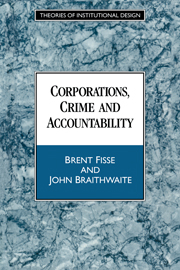Book contents
- Frontmatter
- Contents
- Preface
- Abbreviations
- 1 Crime, Responsibility and Corporate Society
- 2 Individualism
- 3 Enterprise Liability
- 4 Organisation Theory Perspectives
- 5 Making the Buck Stop
- 6 Assessing the Accountability Model
- 7 The Possibility of Responsibility for Corporate Crime
- Bibliography of Cited Works
- Index
1 - Crime, Responsibility and Corporate Society
Published online by Cambridge University Press: 11 March 2010
- Frontmatter
- Contents
- Preface
- Abbreviations
- 1 Crime, Responsibility and Corporate Society
- 2 Individualism
- 3 Enterprise Liability
- 4 Organisation Theory Perspectives
- 5 Making the Buck Stop
- 6 Assessing the Accountability Model
- 7 The Possibility of Responsibility for Corporate Crime
- Bibliography of Cited Works
- Index
Summary
Contemporary Problems of Accountability for Corporate Crime
Two major problems of accountability confront modern industrialised societies in their attempts to control wrongdoing committed by larger scale organisations. First, there is an undermining of individual accountability at the level of public enforcement measures, with corporations rather than individual personnel typically being the prime target of prosecution. Prosecutors are able to take the short-cut of proceeding against corporations rather than against their more elusive personnel and so individual accountability is frequently displaced by corporate liability, which now serves as a rough-and-ready catch-all device. Second, where corporations are sanctioned for offences, in theory they are supposed to react by using their internal disciplinary systems to sheet home individual accountability, but the law now makes little or no attempt to ensure that such a reaction occurs. The impact of enforcement can easily stop with a corporate pay-out of a fine or monetary penalty, not because of any socially justified departure from the traditional value of individual accountability, but rather because that is the cheapest or most self-protective course for a corporate defendant to adopt.
The central aims of this book are twofold: to examine the extent to which existing theories help to resolve the problems of non-prosecution of individuals and non-assurance of internal corporate accountability; and to advance a more responsive program for achieving accountability for corporate crime.
- Type
- Chapter
- Information
- Corporations, Crime and Accountability , pp. 1 - 16Publisher: Cambridge University PressPrint publication year: 1994

